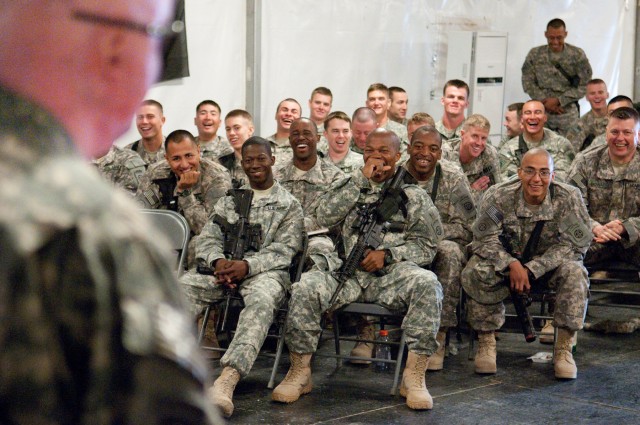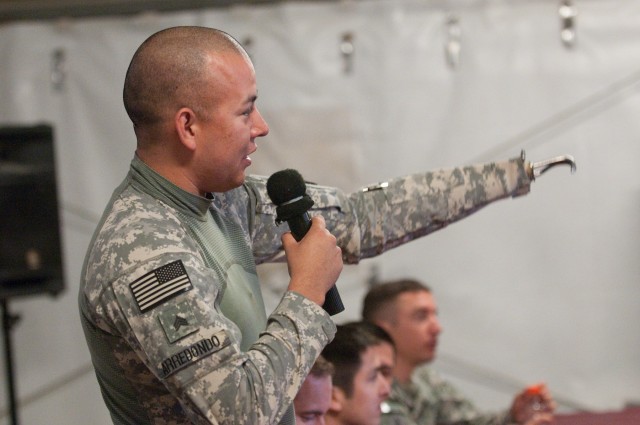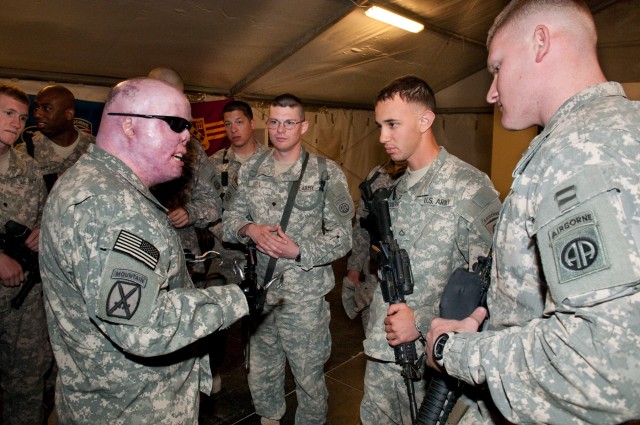AL ASAD AIR BASE, Iraq (Army News Service, April 13, 2010) -- Eight battle-wounded veterans of the Iraq war shared lessons learned from their recovery processes with paratroopers here April 6, including advice on suicide prevention.
Part of the fifth Operation Proper Exit rotation of Soldiers returning to the battlefield to find emotional healing, the wounded warriors engaged in a town-hall discussion at Al Asad's Camp Ripper with paratroopers of the 1st Battalion, 504th Parachute Infantry Regiment, 1st Brigade, 82nd Airborne Division (Advise and Assist Brigade).
"If anyone in your unit unfortunately commits suicide, it's kind of on you guys," said retired Sgt. 1st Class Mike Schlitz, a 33-year-old Ranger-qualified Soldier who was severely burned by an improvised explosive device in Baghdad in 2007.
Though Schlitz received burns over 85 percent of his body, lost both hands and was left with a severely-disfigured face, he spoke with unabashed authority.
Often using humor to approach difficult subjects, his first words reflected back on his own experience of nearly burning to death.
"If you're going to commit suicide by fire, make sure there're no fire extinguishers or people around to help you, or you're going to end up looking like me," he said with a smile.
Once the audience stopped laughing, Schlitz offered serious advice on suicide prevention.
"One thing the Army has is a great peer support group," said Schlitz. "When you're hurt and at Walter Reed Army Medical Center, you have guys who have been there coming down to talk to you to build you back up. They say, 'Hey, life goes on. Look how good I'm doing now,' and that pushes you to go on."
"Out here, you have to look to your left and right to see if your buddy is doing okay, because if he's not, it's up to you to pick him back up. If someone commits suicide, it's that person to the left or right who didn't do their job," said Schlitz.
As the 1st Brigade of the 82nd prepares to redeploy soon, paratroopers need to support each other for the transition to life back home, he said.
"Leaders, that's on you too," he added.
Peer support is also a critical part of the healing process for servicemembers injured in combat, said retired Staff Sgt. Brian Neuman, who lost his left arm to an explosively-formed projectile that blew through his M2 Bradley Infantry Fighting Vehicle in Fallujah in 2004.
"When I got to the medic, I had my left arm in my right hand," he said. "I had no time to think about things."
Once he had time to process his thoughts, Neuman said, the first emotion he felt was guilt. "I knew my guys were still out there," he said.
"If a friend gets hurt, they're going to get the best medical care, but they're still going to worry about the guys still back in the fight," agreed Schlitz. "Send him an email. Make him feel like he's still in the fight."
Schlitz suggested that leaders might send rear-detachment Soldiers to visit the recovering wounded at the hospital.
"It's not about actually knowing the Soldier; it's about that Soldier seeing the uniform and that identical patch on the shoulder to give that support," he said. "Make that wounded guy feel like he's still in the fight so he's motivated to get better."
Maj. David Underwood, who was wounded with retired Cpl. Bryan Hinojosa in 2008 by the same IED, cautioned paratroopers to be extra vigilant against accidents.
The group of wounded warriors was recently briefed by top military officials that almost half of the nearly 5,000 U.S. casualties in Iraq were non-tactical deaths, he said, including 25 deaths in the last year from vehicle rollovers and motor pool accidents.
The veterans returned to Iraq to leave the battlefield on their own terms and to see that their sacrifices were achieving change in Iraq, they said.
"I flew over Fallujah yesterday," said Neuman. "I saw the street where I was hit. We didn't get shot at. I haven't heard any explosions since I've been here."
"Last time I was carried away. I want to get out on my own this time," said retired Sgt. Juan Arredondo, who lost an arm to an IED in Ramadi in 2005. "Of course, I haven't made it out yet," he joked.
"We're here for you guys," said Sgt. Robert Brown, now a Paralympics athlete who was returning for his third time with Operation Proper Exit.
"Why return'" asked Neuman. "Though I am now involved in very successful financial services, I still get a nagging feeling living in a military town of never knowing where I could have been had I stayed in the Army. There's nothing like being a part of this team," he said.
Following the town hall meeting, the group traveled by helicopter back to Camp Liberty in Baghdad.
The route included one long detour, over the town of Rawah near the Syrian border, so that one of the wounded warriors could see for a final time the road where a massive IED broke his jaw and took his right leg.
Operation Proper Exit is expected to continue until U.S. troops have withdrawn from Iraq.
(Sgt. Michael J. MacLeod serves with the 82nd Airborne Public Affairs Office.)






Social Sharing